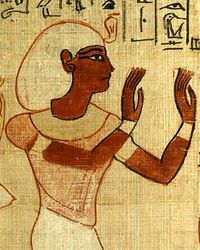Philosophy:Korihor
This article uncritically uses texts from within a religion or faith system without referring to secondary sources that critically analyze them. (August 2019) (Learn how and when to remove this template message) |
Korihor (/ˈkoʊrɪhɔːr/)[1] is an anti-christ described in Alma 30 in the Book of Mormon.
Life
Korihor is directly referred to in the Book of Mormon as Anti-Christ, because he claimed there will be no Christ. Korihor was able to preach his views to the people because of the land's freedom of religion. These teachings alarmed the clerical government in Zarahemla, who felt that his views were dangerous to their society, as people had begun to ignore the laws of the land (which were based on the religious beliefs of their society). He attempted to preach to the people of Ammon, but the residents had kicked him out of Jershon. He also tried preaching in Gideon and he was arrested; before a high priest, during a hearing for his apparent blasphemy and for causing social discord, Korihor offered a speech in his own defense. Korihor was turned over to higher authority and later got into an argument with the chief judge and governor, Alma regarding the existence of God. Alma responded to Korihor's arguments, stating that all things testified that there is a God. Korihor finally demanded that Alma show him a sign from God or he, Korihor, would not believe in God. This culminated in Korihor being miraculously rendered deaf and mute, upon which Korihor confessed, in writing:
...I always knew that there was a God. But behold, the devil hath deceived me; for he appeared unto me in the form of an angel, and said unto me: Go and reclaim this people, for they have all gone astray after an unknown God. And he said unto me: There is no God; yea, and he taught me that which I should say.[2]
Korihor begged for forgiveness, but Alma, sensing that Korihor would go back to his wicked ways, cast Korihor out. Korihor became a beggar and was later trampled to death by the Zoramites, a group who had separated themselves from the main Nephite society.
Teachings
Korihor's statements provide explicit arguments for atheism, which have been categorized as arguments for agnosticism, empiricism, secular humanism, and relativism.[3][4] Perhaps because of the direct treatment that Korihor gives the topic of atheism, his words have been cited by skeptics as exemplary, while devotees cite his teachings in an attempt to inoculate their audiences against similar heresy.[5][6]
Korihor's argument was two-fold. First, that "ye cannot know of things which ye do not see", from which he extrapolated that there is no fairness or unfairness, no crime or sin, no cause for shame, and no eternal consequence of actions.[7] In the absence of sin, the need for an atoning sacrifice[8] and the ordinances and religious participation to connect people to that atoning sacrifice[9] are obviated, and followers are instead encouraged to "look up with boldness", "enjoy their rights and privileges", and "make use of that which is their own".[10] Second, Korihor hypothesizes that the only reason for perpetuation of orthodox beliefs is "a foolish and vain hope"[11] on the part of believers, and, on the part of priests and teachers, a desire "to usurp power and authority over [the people]"[12] and "keep them down, even as it were in bondage, that ye may glut yourselves with the labors of their hands".[13]
Possible origin of the name
Hugh Nibley relates the name to Egypt,[14] and states:
- "The first high priest [of the twenty-first dynasty in Egypt] was called Korihor, and his son was called Piankhi - two Book of Mormon names."
Nibley relates Korihor's name to Kherihor, a high priest at Thebes.[15]
Notes
- ↑ churchofjesuschrist.org: "Book of Mormon Pronunciation Guide" (retrieved 2012-02-25), IPA-ified from «kō´rĭ-hōr»
- ↑ Alma 30:52–53
- ↑ Riddle, Chauncey, Korihor: The Arguments of Apostasy, Neal A. Maxwell Institute for Religious Scholarship, BYU, http://maxwellinstitute.byu.edu/publications/transcripts/?id=45, retrieved 4 April 2012
- ↑ Lund, Gerald N. (July 1992), "Countering Korihor's Philosophy", Ensign (LDS Church), http://www.churchofjesuschrist.org/ensign/1992/07/countering-korihors-philosophy?lang=eng
- ↑ Warner, C. Terry, "An Open Letter to Students: On Having Faith and Thinking for Yourself", New Era (LDS Church), http://www.churchofjesuschrist.org/new-era/1971/11/an-open-letter-to-students-on-having-faith-and-thinking-for-yourself?lang=eng
- ↑ "Chapter 29: Alma 30–31", Book of Mormon Teacher Manual: Religion 121-122 (Institute program, Church Educational System, LDS Church), 2009, http://www.churchofjesuschrist.org/manual/book-of-mormon-teacher-manual/chapter-29?lang=eng
- ↑ Alma 30:15–18
- ↑ Alma 30:12–17
- ↑ Alma 30:23
- ↑ Alma 20:27–28
- ↑ Alma 30:13
- ↑ Alma 30:23
- ↑ Alma 30:27
- ↑ Nibley, Hugh & Hummel, Sharman Bookwalter (ed.) Nibley's Commentary on the Book of Mormon, Vol. 1 (2013), ASIN: B00GFY0GUO
- ↑ Lehi in the Desert, p. 27. Nibley's source for the Egyptian name is Hermann Ranke, Die Agyptischen Personennamen ["The Egyptian Personal Names"], Gluckstadt: Augustin, 1935.
Further reading
- Welch, John (2011). The Legal Cases in the Book of Mormon. Provo, Utah: Brigham Young University Press; Neal A. Maxwell Institute for Religious Scholarship. ISBN 978-0842527125. OCLC 232358237. http://publications.maxwellinstitute.byu.edu/book/the-legal-cases-in-the-book-of-mormon/. Retrieved 2013-12-18.
- Lund, Gerald N. (1992). "An Anti-Christ in the Book of Mormon--The Face May Be Strange, but the Voice Is Familiar". in Nyman, Monte S.; Tate, Charles D., Jr.. The Book of Mormon: Alma, the Testimony of the Word. Provo, Utah: Religious Studies Center, Brigham Young University. p. 107–28. ISBN 0-8849-4841-2. https://rsc.byu.edu/archived/book-mormon-alma-testimony-word/7-anti-christ-book-mormon-face-may-be-strange-voice.
External links
 |


